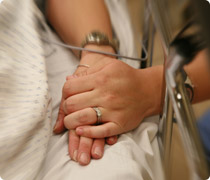As I write this blog, many in California are celebrating the Governor’s signing of the “Right-to-Die” bill otherwise known as AB 15. This new law allows physicians to prescribe lethal doses of drugs to terminally ill patients who want to end their life rather than suffer through the course of the disease. Those celebrating its passage see AB 15 as a long-awaited, compassionate response to terminal illness; “why suffer when you can end your life in dignity?”
I’ve seen firsthand the indignities and suffering of terminal illness. I watched my brother, Willie, die of liver cancer – it ultimately spread to his lungs and slowly robbed him of his breath and ultimately his life – and I’ve witnessed many (too many) deaths in the congregation over the years. Suffice to say that my experience these last 20 years has sensitized me to the array of complex and often emotional issues surrounding assisted suicide. Do we have a right to die? Is dignity a higher value than life itself? What if the doctors are wrong and the condition is not terminal, at least not within the often-cited six-month window? What happens to the patient-doctor relationship when your physician can also be your assassin? What safeguards are in place for the most vulnerable – disabled, poor, elderly, depressed, etc.…?
What about the slippery slope? What kind of Pandora’s Box are we opening? Judaism only allows for suicide under extreme conditions not included or envisioned in any modern legislation. How can we condone a practice forbidden by almost every reading of Jewish law and medical ethics? The highest value in Jewish law and tradition is the preservation of life, but what do we do when to live is to suffer?
While the overwhelming majority of Jewish thinkers, across the spectrum of Jewish movements, are against active euthanasia or assisted suicide, a similar majority supports both palliative care and hospice as approaches to terminal illness. In other words, Judaism holds that, just as we are commanded to heal when we can, we are also commanded to treat pain and suffering, even if a byproduct of the treatment hastens death. Moving from what some call “passive euthanasia” to “active euthanasia”, deliberately doing something that causes the patient to die, is the “red line” in Jewish tradition that few believe it is okay to cross, the general notion being that only God, not a person, “gives” and “takes” life.
As liberal/non-Orthodox Jews, we believe that Jewish tradition has a vote but not a veto in our lives. Ultimately we decide to what degree we will follow Jewish tradition and ethics. In other words, we embrace moral autonomy as a basic precept for better and for worse! That means that whether we embrace the “right-to-die” is a very weighty and personal choice and in that sense I both respect and agree with what Governor Brown said about his signing of AB 15 into law:
“In the end I was left to reflect on what I would want in the face of my own death. I do not know what I would do if I were dying in prolonged and excruciating pain. I am certain however, that it would be a comfort to be able to consider the options afforded by this bill. And I would not deny that right to others.”
Governor Brown is right: Judaism may not support the right to die, but this isn’t the first time that tradition has lagged morality. While this new law is a step toward compassion and dignity, we take it tentatively, mindful of the pitfalls along this new and uncharted path, where our Jewish compass, at least as it is currently calibrated, is of limited use.

Rabbi G - excellent commentary…I kept waiting for the proverbial “Jewish law says…” but your approach of a “vote, not a veto” is a superb representation of how many (including myself) feel. Same goes for keeping Kosher, wearing various garments, etc. Very well-positioned blog post - thanks!
I agree with the fact that it is a comfort to have that option but when it comes down to it would we/I really do it? We will only know when the time arises. When it comes to suffering I think many people don’t want the living to suffer along with them which poses another so called pitfall for us to wonder about. It is very hard to watch someone deteriorate, I personally can’t let those vision go. It leaves a mental and visual scar with me …
I appreciate your comments George as thorough and thoughtful.
My concern remains in the law itself and not the premise.
The issue has become politicised, and fuelled by multimillion dollar campaigns,replete with slick marketing campaigns and slogans. (Is it accurate to call this “RightTo Die ”
Surely its more accurately “State Sanctioned right to physician assisted suicide” )
The problem with the slippery slope is that you dont know when you are on it.
Belgian and Dutch experience provides ample evidence that they are both on that slope. 1 in 30 deaths in the Netherlands and 1 in 22 in Belgium are by euthanasia, and increasing. Psychological suffering has been added as a criteria and in Holland there is sentiment to include children age 1 to 11. If your own Doctor refuses you have a right to opinions from other more willing Doctors. Right to Die Activists provide educational materials in Dutch High schools, and also in Holland, there are now travelling euthanasia doctors.
I question whether our law provides ample collection,asessment, and monitoring of data and performance, and the political skill and will to notice and correct abberations-let alone abuse.
The epistomological trap of not being aware of what we dont know,especially as it applies to social engineering looms heavily for me.
Honestly, I think having the option for the right situation is appropriate. However, do we ever have a guarantee that a terminal situation is just that? And what about living life to the fullest in a situation that is terminal? And, what about “God gives life”; how can we take it away? (that sure makes me think!) I personally would never want my loved ones to watch me deteriorate to the point of a long, drawn out situation so in that case, I am for assisted suicide; definitely a personal decision.
Thank you George for opening up this subject,
I am a supporter of Compassion and Choice. There are too many times that we deny that the body we live in is our body. When my husband Bob was dying he declared with authority that he wanted to die when he could no longer drive. then when he couldn’t play bridge, then when he required a feeding tube. . Each day the line receded and he went on and stayed in charge. When he was ready to really go he breathed a sigh of relief. I don’t want anyone have dominion over my body. I have written out instructions to each of my sons and made the whole fame;y aware of what i want. I always have the right to push the barriers back. Judaism says choose life but inherent is that decision is about what I consider to be living.As long as we have a choice I believe we have a right to exercise that choice.
I applaud Governor Brown for signing the bill.
There are plenty of examples of Jewish tradition failing to keep pace with our evolving understanding of right and wrong. Many behaviors condoned in scripture are rightly considered unjust, inhumane, immoral, and often illegal in contemporary life (slavery, homophobia, and capital punishment for non-capital crimes come to mind, but there are many others). Traditional belief systems are handy and in many ways beautiful things, but they should never preclude the exercise of our own God-given capacity for reason, judgement, compassion, and thoughtful self-determination.
Regarding “In God’s hands”, I believe God acts through us, particularly regarding acts of kindness. Though an extreme, I see assisted death as such an act.
I recently shared a dear friend’s deterioration from Lou Gehrig’s. When she could hardly speak, eat,breath, hold her head up or walk from here to there…she got ahold of something and had a farewell party with close friends. Who can blame her?
However, being a sufferer of depression myself, I think we have to maintain very strict regulations , both religious and legal against suicide in response to emotional issues. Which also raises this question – Assuming we can decide what actions we as a humane and thoughtful society will or will not allow people in this tragic condition or frame of mind/heart –what are we prepared to do FOR them?
Gary Tharler